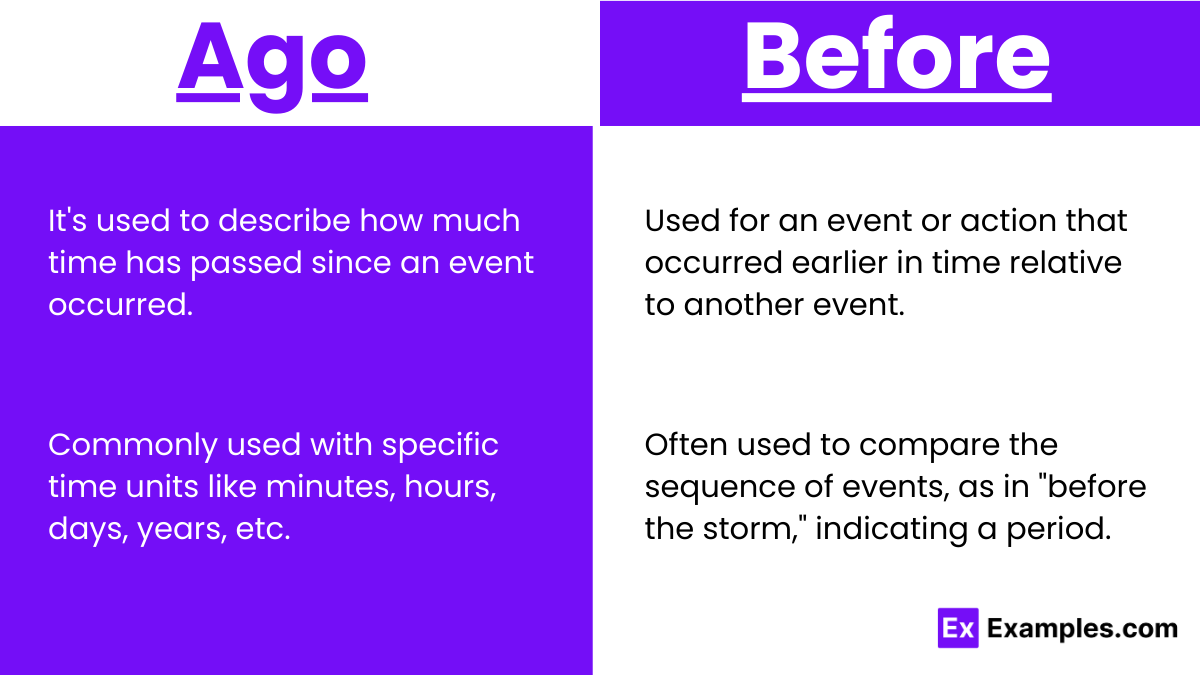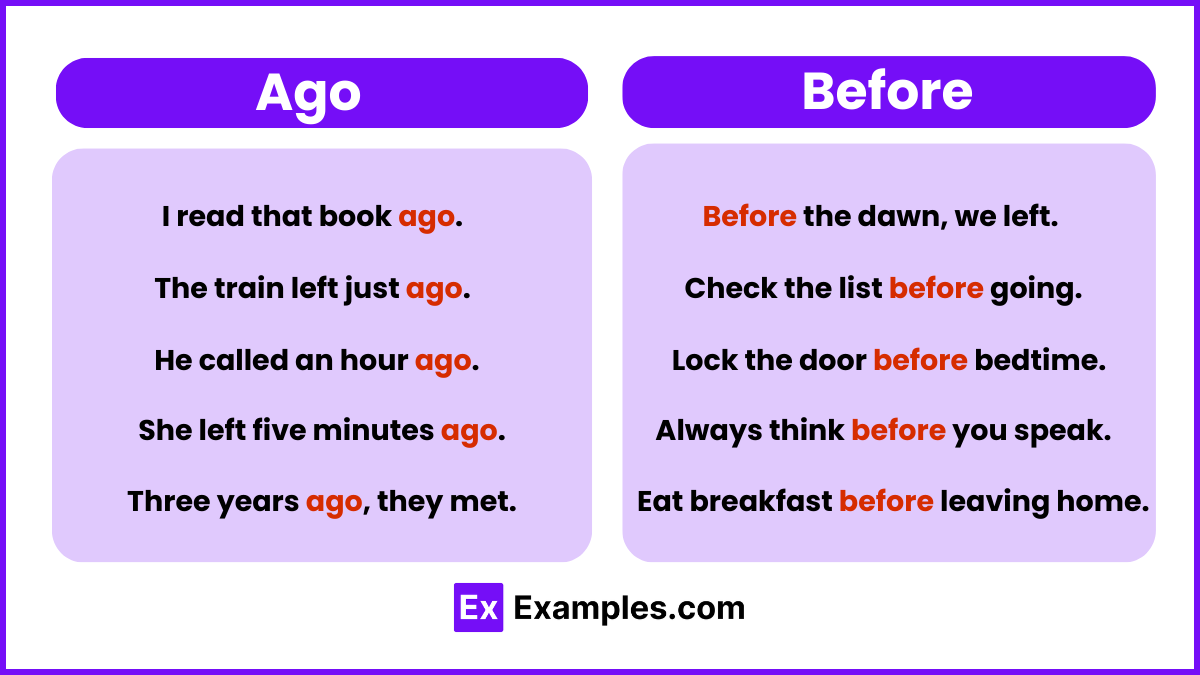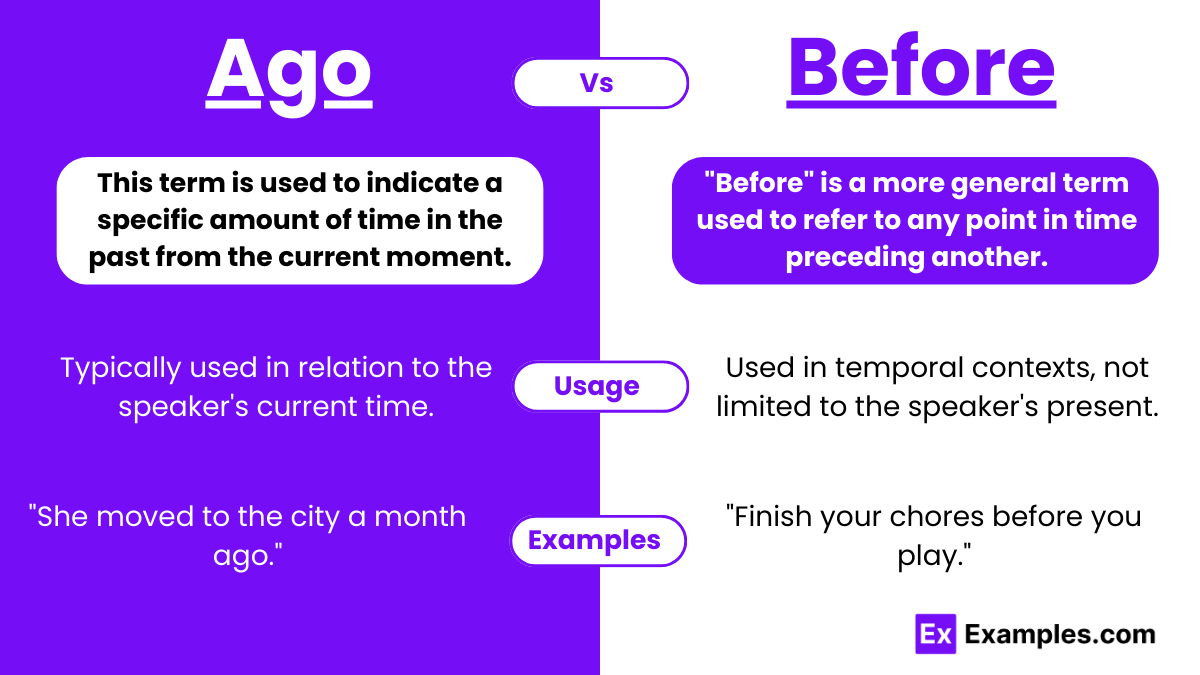Ago vs Before – Meanings, Difference, Examples & How to use
Understanding the difference between “ago” and “before” can greatly improve how we talk about time. “Ago” refers to a specific time in the past from now, like “three days ago.” “Before” means any time earlier than a certain point, like “before noon.” Let’s dive into the details of these two words to use them correctly.
Ago and Before – Meanings
- Ago: This term is used to indicate a specific amount of time in the past from the current moment. It refers to a past period relative to the present and is often used with a number to specify exactly how far back in time an event occurred.
- Before: In contrast, “before” is a more general term used to refer to any point in time preceding another. It can denote an event happening earlier than another event or a specified time, without necessarily indicating a precise duration from the present.
Summary
“Ago” and “before” both refer to times in the past, but they are used differently. “Ago” is an adverb that indicates a specific amount of time has passed from the present moment, such as “two weeks ago.” It is always measured from the current time. On the other hand, “before” can be a preposition or an adverb, referring to a time preceding a particular event or moment, without necessarily linking it to the present, as in “before the meeting” or “I’ve seen this before.” Understanding their usage helps clarify the timing of events in relation to the present or other reference points.
How to Pronounce Ago and Before
- Ago: Pronounced as /əˈɡoʊ/, this two-syllable word emphasizes a past time, with a stress on the second syllable, reflecting its role in looking back from the present moment.
- Before: Pronounced as /bɪˈfɔːr/, this two-syllable word has a stress on the second syllable, capturing the essence of precedence or priority in time.
Differences between Ago and Before
| Aspect | Ago | Before |
|---|---|---|
| Definition | Indicates a specific amount of time in the past from now. | Refers to any point in time that precedes another. |
| Specificity | Requires a quantifier to specify the duration (e.g., “two weeks ago”). | Can be used without specifying an exact duration. |
| Context | Used with past events relative to the present. | Used to denote precedence without direct reference to the present. |
| Usage | Typically used in relation to the speaker’s current time. | Can be used in various temporal contexts, not limited to the speaker’s present. |
| Grammatical Form | Follows the time quantifier (e.g., “10 years ago”). | Often used with events or actions to indicate precedence (e.g., “before the meeting”). |
How to Remember the Difference between Ago and Before
To remember the difference between “ago” and “before,” think of “ago” as pointing backward from the present moment (like looking over your shoulder), and “before” as indicating any time prior to a specific event or moment (like pointing ahead to a landmark on a timeline). A simple trick: “Ago” is for when you’re counting back from now, “before” is for everything else in time.
When to Use Ago and Before

Usage of Ago
- Past Reference: “Ago” refers to time elapsed from the present to the past. It’s used to describe how much time has passed since an event occurred.
- Specific Time Frame: Commonly used with specific time units like minutes, hours, days, years, etc. For example, “two days ago” means two days before the current day.
- Present-Centric: Emphasizes the distance between the present moment and a past event. It’s essential for establishing a timeline or discussing recent history.
- Contextual Relevance: Helps in storytelling, reporting events, or discussing historical occurrences by anchoring them to a point in time relative to the present.
Usage of Before
- Preceding Event: “Before” indicates an event or action that occurred earlier in time relative to another event. It establishes a temporal relationship between two points.
- General Time Frame: Unlike “ago,” “before” is more flexible and can refer to events occurring in the past without specifying exact time intervals.
- Comparative Use: Often used to compare the sequence of events, as in “before the storm,” indicating a period preceding a specific event or condition.
- Future Reference: In rare cases, “before” can refer to events or actions expected to happen in the future concerning a specified point in time, though context is crucial.
How to Use Ago and Before
Using Ago
- As an Adverb: “Ago” is primarily used as an adverb, indicating a time in the past relative to the present moment. When using “ago,” the reference point is always ‘now,’ and it is typically used with expressions of time. For example, in the sentence “I moved to the city five years ago,” “ago” is used to indicate that the action of moving happened five years in the past from the current time.
Using Before
- As a preposition: As a preposition, “before” indicates precedence in time or place in a statement. For instance, in the sentence “Finish your homework before dinner,” “before” is used as a preposition to show that the homework needs to be completed prior to the time of having dinner.
- As an Adverb: When used as an adverb, “before” refers to an earlier period, as in “I’ve seen this movie before,” indicating that the action of seeing the movie occurred at an unspecified time in the past.
Ago and Before – Examples

Examples of Ago
- “I graduated ten years ago.”
- “It rained heavily a few days ago.”
- “We met him long ago, in our childhood.”
- “She moved to the city a month ago.”
- “The event took place centuries ago.”
Examples of Before
- “Finish your chores before you play.”
- “She had never seen him before that day.”
- “Before the digital era, people relied on print media.”
- “Please submit the report before Friday.”
- “I always check the news before starting my day.”
Synonyms
| Term | Synonyms |
|---|---|
| Ago | Previously, earlier |
| Before | Prior to, preceding |
Exercise
Fill in the blanks with either “ago” or “before” to complete the sentences accurately.
- I saw her two weeks _____.
- The deadline is _____ midnight.
- She had visited that place long _____.
- Please turn off the lights _____ you leave.
- We had discussed this topic just a moment _____.
Answers
- ago
- before
- ago
- before
- ago
FAQ’S
Is it five years ago or five years before?
Use “five years ago” when referring to an event that occurred in the past. “Five years before” is less common and may imply a specific reference point.
When should I use ago?
Use “ago” to denote time elapsed from the present to the past, like “two days ago” meaning two days before the current day.
What is the difference between days ago and days before?
“Days ago” refers to the time that has passed since an event occurred, while “days before” typically refers to a specific point in the past.
Is it 2 years ago or 2 years back?
Both are correct, but “2 years ago” is more commonly used in everyday language. “2 years back” is less formal but equally understood.
Is it 3 years back or ago?
Use “3 years ago” to indicate time passed since an event. “3 years back” is less common but still acceptable, often used conversationally.


